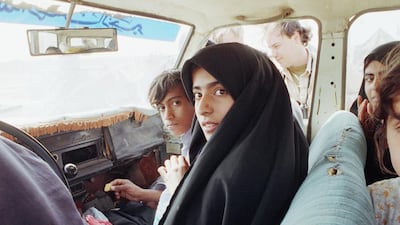Early into Hala Alyan’s remarkable debut novel, Hussam Yacoub, the patriarch of a wealthy Palestinian family, asks his daughter’s suitor where he intends to settle. “In my homeland, sir,” comes the reply. “Nothing under this sky will budge me.” But that sky grows overcast, and in time Israeli tanks roll in and the whole family is budged out by war and buffeted into exile – “far from this blazing country split in two”. What begins as a tightly focused tale of condensed upheaval and relocation for one strand of a family soon expands into a sprawling and engrossing epic charting the turbulent displacement and dispersal of several generations in the course of six decades.
Salt Houses opens in Nablus in 1963 with Salma, Hussam's wife. On the eve of her daughter Alia's wedding, she casts back 15 years to the days of terror that forced the family to flee their Jaffa villa. But Salma also looks forward, noting with alarm the ominous grounds in Alia's coffee cup, which portend "an exterior life, an unsettled life".
From here, Alyan proceeds in sharp shifts, devoting each chapter to a different family member at a further point in time. Before we properly meet Alia and discover just how unsettled a life she is leading, we fast forward to 1965 and a segment about her brother, Mustafa. With his father dead and his mother starting anew in Amman, he has inherited the family house in Nablus and lives lazily there. A sense of purpose arrives via “boys-only meetings” at a mosque after dark led by an impassioned imam who lectures young men about war, patriotism and lost land. “We are pawns in a sick and depraved game,” he tells Mustafa. “We can either play or overturn the chessboard.”
Once again, Alyan makes her reader wait to learn of a character’s fate. She switches next to Alia, who, while visiting her sister Widad in Kuwait City in 1967, is hot, homesick and pregnant. When the Arab-Israeli War of that year breaks out, she is also fearful and confused (“That almost-week jumbled everything”). Then, at one point during her stay, she is assailed by a sudden wave of grief. Mustafa, we are finally told, disappeared and “died somewhere in an Israeli prison”.
Thus the novel unfolds kaleidoscopically and elliptically, and to supremely good effect. Some segments are more absorbing than others. Atef, Alia’s husband, emerges as a flawed and fascinating individual, a proud and happy family man routinely plagued by nightmares of past torture and haunted by his best friend Mustafa’s absence. His two daughters, Riham and Souad, are extreme personalities, “one godless and unruly, the other veiled and earnest and married.” The family is once again uprooted when Saddam Hussein invades Kuwait, and various descendants are scattered as far afield as Beirut, Paris and the United States. Each place reshapes them – to the extent that for some of the younger generations, unvisited Palestine remains foreign, distant and abstract. That is until Alyan’s terrific final chapter, which follows Souad’s American-based daughter, Manar, making a pilgrimage to the land of her grandparents to trace her heritage. She gets off to a bad start: at Ben Gurion International Airport she is singled out and interrogated; in Nablus she feels claustrophobic and “like an interloper, trespassing on memories that had nothing to do with her”. Only when she arrives in Jaffa and reads through old family letters does she experience a faint yet vital twinge of kinship.
Alyan is a Palestinian-American poet and much of her novel taps into her own mixed make-up and showcases her lyrical facility. Her language can be supple and gentle (“the contradictory weight of eggs”) and necessarily fierce and harsh, particularly when examining the problems of identity. “You’re fair-weather Arabs,” scoffs one character to his westernised counterparts. “No wonder you’re messed up,” says another. “You’ve been emotionally code-switching all your life.”
Only occasionally does Alyan’s phrasings feel overblown, her metaphors forced. “Their marriage had a glove compartment, a hollow, cluttered space where emotional debris went.” Later, and in a similar vein: Palestine “was a hat rack for all her discontent”. Otherwise, Alyan maintains perfect poise, recounting births, deaths and marriages and rendering the twin trials of displacement and assimilation in captivating prose that manages to be both tender and powerful.
A family tree on the first pages may actually end up a disincentive, as recent fictional sagas have been thick with tangled branches, resulting in readers losing their way or their patience. In contrast, Salt Houses contains just the right amount of offshoots – that is, well-drawn, fully formed characters who affect us and who we come to know intimately.
Malcolm Forbes is a freelance writer based in Edinburgh.

